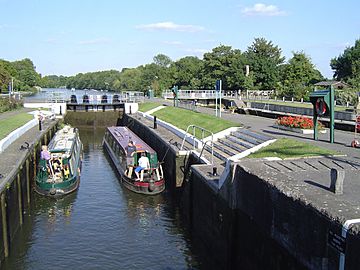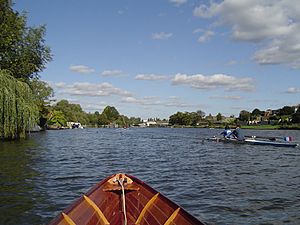Sunbury Lock facts for kids

Sunbury lock with boats in the older hand-operated lock. The new lock is on the right
|
|
| Waterway | River Thames |
|---|---|
| County | Surrey |
| Maintained by | Environment Agency |
| Operation | Old Manual New Hydraulic |
| First built | 1812 (removed) 1856 (middle) 1927 (bankside) |
| Length | Old 47.15 m (154 ft 8 in) New 62.78 m (206 ft 0 in) |
| Width | Old 5.86 m (19 ft 3 in) New 7.41 m (24 ft 4 in) |
| Fall | Both locks 1.87 m (6 ft 2 in) |
| Above sea level | 27 feet (8 m) |
| Distance to Teddington Lock |
8 miles |
| Coordinates | 51°24′18.5″N 0°24′22″W / 51.405139°N 0.40611°W |
| Power is available out of hours | |
Sunbury Lock is a special water "elevator" for boats on the River Thames in England. It's located near Walton-on-Thames in north-west Surrey. This lock complex is the third lowest of 44 locks on the non-tidal parts of the river. It sits on the right, southern bank, about half a mile downstream from the Weir Hotel.
The Sunbury Lock complex actually has two locks: an older one and a newer one. They are separated by a narrow concrete wall. These locks are located downstream from the very first lock built here in 1812. The older lock, built in 1856, is operated by hand and isn't used very often. The newer lock, which uses hydraulic power, was opened in 1927 by Lord Desborough. There are also rollers and a slope next to the lock. This helps people easily move small boats over land, a process called portage. The lock is right next to a small island called Sunbury Lock Ait.
Upstream from the lock, there are three weirs. Weirs are barriers that control the flow of water. The main weir is between Sunbury Lock Ait and Wheatley's Ait. Wheatley's Ait has two other weirs, one of which is a small weir used only during storms.
Contents
A Look Back: History of Sunbury Lock
Why Locks Were Needed
Long ago, in 1789, a big weir was built here. Its main job was to make the river deeper for boats to travel. Before this, many parts of the River Thames around Sunbury were shallow. This was especially true when the old London Bridge was still standing (from 1209 to 1831). The old bridge caused a lot of mud and sand to build up downstream, making the river very shallow in places.
Building the First Locks
The first idea for a lock here came in 1805. A lock is like a chamber that raises or lowers boats between different water levels. A plan was approved in 1809, and the first lock opened in 1812. It was built near the footbridge that leads to Sunbury Lock Ait. The lock house from that year is still there today. A long channel, or "cut," was dug above the lock. This expanded a natural waterway next to an island called Church Island.
New Locks for a Growing River
By 1852, the first lock was falling apart. Also, water companies wanted to take a lot of water from the river below the lock. This made it even more important to rebuild. So, the lock was moved a bit downstream and reopened in 1856. A new lock house was built then too. Later, in 1927, a second lock was added at Sunbury. This new lock was officially opened by Lord Desborough, who was the head of the Thames Conservancy at the time.
Visiting Sunbury Lock
How to Reach the Lock
You can't drive directly to Sunbury Lock. The best way to get there is by walking along the towpath. You can start your walk from The Weir Hotel in Walton-on-Thames.
Kayaking and Water Sports
The area around the weir and Wheatley's Ait is popular for kayaking. This part of the river is known as the Creek. Kayakers often use it when coming from the northern bank, between Shepperton and Sunbury-on-Thames.
River Activities Above the Lock
The River Path and Islands
Above Sunbury Lock, there's a 300-meter long channel that connects to the Weir Hotel. This hotel faces the Sunbury Weir. After the weir, you'll find Wheatley's Ait, which has an Environment Agency work area and riverside homes. Further along, you'll see more houses, small parks, and a marina on the "Walton Mile" and "Cowey Sale" sections of the river. There are also two pubs and another marina.
River Branches and Islands
After Walton Bridge, the river splits into two paths. The old river course winds through Lower Halliford and Old Shepperton. The other path is a direct channel called the Desborough Cut, which runs alongside Desborough Island. The two paths rejoin before Shepperton Lock. This is also where the Wey and Godalming Navigations, the River Bourne, and two mouths of the River Wey join the Thames, surrounding Hamhaugh Island. Right after these, including the lock, you can find the Shepperton to Weybridge Ferry.
Checking Your Speed
Along the Desborough Cut, there are special markers called Navigation transit markers. These help boat users check how fast they are going.
Sports on the River
This part of the river is a hub for water sports! There are six rowing clubs, a skiffing club, and clubs for sailing and canoeing. Many annual events take place here, including the Walton and Weybridge Regatta, Walton Small Boats Head, Weybridge Silver Sculls, Weybridge Ladies Regatta, and Walton Skiff Regatta.
Thames Path Walking Trail
The Thames Path is a long-distance walking trail. It follows the Surrey bank of the river until just before Shepperton Lock. To continue on the path, walkers usually take a ferry across the river. If you want to avoid the ferry, you'd have to take a much longer detour over Walton Bridge and through Shepperton.
Sports Clubs in the Area
Here are some of the sports clubs you can find on this stretch of the river:
- Elmbridge Canoe Club
- Walton Rowing Club

- Weybridge Rowing Club

- Weybridge Ladies Rowing Club
- Weyfarers (a recreational and pilot gig rowing club)
- St George's College Boat Club
- Thames Valley Skiff Club
- Desborough Sailing Club
Kayaking at Sunbury Weir
The Best Spot for Kayaking
Sunbury Weir is known for having the biggest and fastest freestyle kayaking "playspot" on the River Thames. It's a wide area with strong, surging water. This spot is best for experienced paddlers, not for beginners. The line where the fast water meets the calmer water (called the eddyline) can be very tricky to cross.
How to Get There
There's a public car park on Fordbridge Road, located on the left bank above the weir. From the car park, you can walk across a football pitch and playground to reach a backwater called the Creek. This Creek joins the river just below the main weir.
Weir Gates and Water Levels
The gates at Sunbury Weir are opened or closed to control the water flow. The storm weir along the Creek also has gates. For the best kayaking conditions, Sunbury Weir needs to be at a specific water level. This level depends on how many gates are open at the next weir downstream, which is Molesey Lock. Kayaking websites often provide details about the best water levels.
Important Water Level Notes
- For good kayaking features, Sunbury Weir usually needs to have at least 1.5 gates open. The exact water level in the pool also matters.
- Hurley Weir (another weir on the Thames) needs at least 3 gates open for enough water.
Sunbury Lock in Books
Sunbury Lock is even mentioned in famous books! It appears in Jerome K. Jerome's funny book, Three Men in a Boat. He wrote:
- "The river is sweetly pretty there just before you come to the gates, and the backwater is charming: but don't attempt to row up it"


